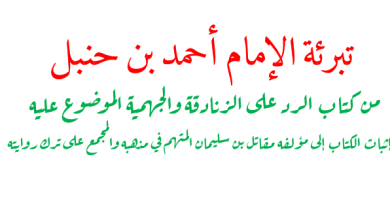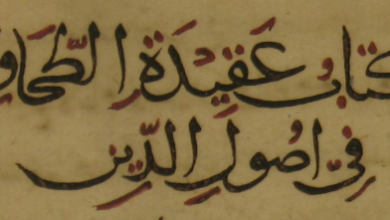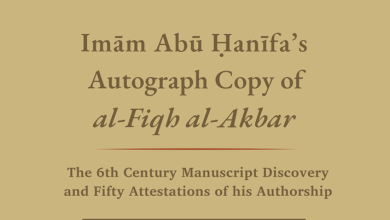Zubair ʿAlī Zaiʾī (d. 2013) on the Sharḥ al-Sunna ascribed to al-Barbahārī (d. 329 AH)
In continuation of a previous article on this site entitled: Al-Albānī on the Ḥanbalī: Al-Barbahārī (d. 329 AH) and his extremism in ʿAqīda (see here: https://www.darultahqiq.com/al-albani-on-the-%e1%b8%a5anbali-al-barbahari-d-329-ah-and-his-extremism-in-%ca%bfaqida), the following is a translation of the verdict of the late Pakistani Salafī authority known as Zubair ʿAlī Zāʾī (d. 2013) who categorically rejected both the work’s reliability and its ascription to al-Barbahārī. The answer by Zubair ʿAlī Zāʾī was uploaded here – https://ishaatulhadith.com/unicode/imam-hasan-bin-ali-albarbahari-ki-kitab-sharahus-sunnah/
Translation:
Question: Is there a book called “Sharḥ al-Sunna” by Imam al-Ḥasan ibn ʿAlī al-Barbahārī?
Answer by Shaykh Ḥāfiẓ Zubair ʿAlī Zāʾī (may Allah have mercy on him):
There is no doubt that Imam Abū Muḥammad al-Ḥasan ibn ʿAlī ibn Khalaf al-Barbahārī (died 329 AH) was among the great Imams of the Ḥanābila. Ḥāfiẓ al-Dhahabī says: “Shaykh al-Ḥanābila, the exemplar, the Imam… the jurist. He was one who spoke the truth, a caller to the narrations [āthār], who did not fear the blame of any blamer for the sake of Allah.” (Siyar Aʿlām al-Nubalāʾ: 15/90)
However, the printed book with the title “Sharḥ al-Sunna” is not established from Imam al-Barbahārī. The manuscript from which this book was published has written on its title page: “Kitāb Sharḥ al-Sunna ʿan Abī ʿAbdillāh Aḥmad ibn Muḥammad ibn Ghālib al-Bāhilī Ghulām Khalīl (may Allah have mercy on him), narration of Abū Bakr Aḥmad ibn Kāmil ibn Khalaf ibn Shajarah al-Qāḍī.”
On the first page of the manuscript, the chain of transmission [sanad] of this book is recorded as follows:
“We were informed by the Shaykh, the trustworthy Imam Abū al-Ḥasan ʿAbd al-Ḥaqq ibn ʿAbd al-Khāliq. It was said to him: Abū Ṭālib ʿAbd al-Qādir ibn Muḥammad ibn ʿAbd al-Qādir ibn Muḥammad ibn Yūsuf informed you at the congregational mosque while he was listening. It was said to him: Shaykh Abū Isḥāq Ibrāhīm ibn ʿUmar ibn Aḥmad al-Barmakī informed you regarding what he permitted you to narrate from him and authorized for you, so acknowledge this. And he said: Yes. He said: Abū al-Ḥasan Muḥammad ibn al-ʿAbbās ibn Aḥmad ibn al-Furāt (may Allah have mercy on him) informed us in his book and it was read from his book. He said: Abū Bakr Aḥmad ibn Kāmil ibn Khalaf ibn Shajarah al-Qāḍī informed us by reading to him. He said: Abū ʿAbdillāh Aḥmad ibn Muḥammad ibn Ghālib al-Bāhilī handed this book to me and said to me: ‘Narrate this book for me from its beginning to its end.’ Abū ʿAbdillāh Aḥmad ibn Muḥammad ibn Ghālib al-Bāhilī said…”
On the last page of the book it is written: “Abū ʿAbdillāh Ghulām Khalīl said,” etc.
It becomes clear that this book belongs to Ghulām Khalīl, which Qāḍī Aḥmad ibn Kāmil narrated from him.
Now the introduction of the basic narrators of this book is presented so that the reality becomes clear and doubts can be removed:
Introduction to Ghulām Khalīl:
Imam al-Dāraquṭnī said: “Abandoned [matrūk]” (Kitāb al-Ḍuʿafāʾ wa al-Matrūkīn by al-Dāraquṭnī: 58)
Ibn ʿAdī said: “His narrations are objectionable [manākīr], countless in their abundance, and he is clearly weak.” (al-Kāmil 1/199)
Ismāʿīl ibn Isḥāq al-Qāḍī said about Ghulām Khalīl: “Little by little, you lie.” (al-Majrūḥīn by Ibn Ḥibbān 1/151, and its chain is good [ḥasan])
Ḥāfiẓ al-Dhahabī said: “Known for fabrication [maʿrūf bil-waḍʿ],” meaning this person is known for fabricating narrations. (Dīwān al-Ḍuʿafāʾ: 92)
Shaykh Khālid ibn Qāsim al-Radādī is a Ḥanbalī scholar with the best character among the Salafīs. The Salafī scholars are eloquent in praising him. I met him at his home in Madīnah al-Ṭayyiba. Shaykh Khālid (may Allah preserve him) writes about Ghulām Khalīl: “Indeed, this Ghulām Khalīl is a liar and fabricator [kadhdhāb waḍḍāʿ].” (Introduction to Sharḥ al-Sunna, p. 42)
(The response to Shaykh Khālid’s doubts comes later, Allah willing)
Introduction to Qāḍī Aḥmad ibn Kāmil:
No clear authentication [tawthīq] of the Judge (Qāḍī) from any traditionist [muḥaddith] is established, while Imam al-Dāraquṭnī says:
“He was careless [mutasāhil]. Sometimes he would narrate from his memory what was not in his book, and arrogance destroyed him.”
(Questions of al-Sahmī: 176)
Note: Later, authentication of Judge (Qāḍī) Aḥmad ibn Kāmil was found, so according to the preferred opinion, he is considered trustworthy by the majority and thus a truthful narrator of good narration [ṣadūq ḥasan al-ḥadīth]. See monthly al-Ḥadīth Ḥaḍraw: Issue 55, p. 30.
Despite the established authentication of Qāḍī Aḥmad, “Sharḥ al-Sunna by al-Barbahārī” remains unestablished because Ghulām Khalīl himself is a liar, therefore Imam al-Barbahārī is free from this book.
Removing Shaykh Khālid al-Radādī’s Doubts:
Shaykh Khālid al-Radādī al-Madanī has claimed that the manuscript of “Sharḥ al-Sunna by al-Barbahārī” has been corrupted and altered.
1: In the manuscript it says “from the third generation [qarn] to the fourth generation” (112), from which al-Radādī takes the meaning of historical century, i.e., from 301 AH to 399 AH, whereas it refers to those generations mentioned in the narration “The best of people are my generation [qarnī],” etc. Allama al-Nawawī said: “The correct view is that his ﷺ generation is the Companions, the second is the Followers [Tābiʿīn], and the third is the Followers of the Followers [Tābaʿ al-Tābiʿīn].” (Sharḥ al-Nawawī li-Ṣaḥīḥ Muslim: 16/85, ḥadīth 2533)
The last Companion, Abū al-Ṭufayl (may Allah be pleased with him)… died in 110 AH… (al-Taqrīb: 3111)
The last Follower… died in 170 AH… and the last Follower of Followers died in 220 AH. (Fatḥ al-Bārī 7/6, ḥadīth 3650)
According to this calculation, the fourth generation is from 220 AH to 270 AH or 280 AH. Ghulām Khalīl died in 275 AH, so assuming correctness, his saying “to the fourth generation” is completely correct because he lived through the entire fourth generation! And taking it to mean from 301 AH to 399 AH is wrong.
2: Aḥmad ibn Kāmil al-Qāḍī is among the famous students of Ghulām Khalīl. Al-Khaṭīb al-Baghdādī writes: “Those who narrated from him… and Aḥmad ibn Kāmil al-Qāḍī,” meaning Aḥmad ibn Kāmil al-Qāḍī narrated from Ghulām Khalīl. (Tārīkh Baghdād 5/78)
Aḥmad ibn Kāmil himself reported that Ghulām Khalīl… died in 275 AH… (Tārīkh Baghdād 5/80)
Ḥāfiẓ al-Dhahabī said: “Ghulām Khalīl… and from him Ibn Kāmil [narrated]” (Mīzān al-Iʿtidāl 1/141)
Imam al-Ḥākim al-Naysābūrī said in mentioning Ghulām Khalīl: “He narrated from a group of trustworthy people fabricated narrations [aḥādīth mawḍūʿa], as Qāḍī Abū Bakr Aḥmad ibn Kāmil ibn Khalaf told us about his asceticism [zuhd] and piety [waraʿ]. We seek refuge in Allah from an asceticism that places its possessor in such a position.” (al-Madkhal: p. 121, biography 18)
I did not find Aḥmad ibn Kāmil among al-Barbahārī’s students, nor al-Barbahārī among Aḥmad ibn Kāmil’s students.
3: This book attributed to al-Barbahārī is known and recognized only through the chain of Ghulām Khalīl and Qāḍī Aḥmad ibn Kāmil, therefore this entire book is suspect.
4: Those who wrote about al-Barbahārī’s circumstances and attributed the book “Sharḥ al-Sunna” to him – none of them saw al-Barbahārī. Statements without chains [of transmission] have no authority in the scholarly field. For example, Qāḍī Abū al-Hussain Muḥammad ibn Abī Yaʿlā (born 451 AH, died 526 AH) quoted from Ḥasan ibn ʿAlī ibn Khalaf al-Barbahārī (died 329 AH) without any chain that he wrote this and that in Sharḥ al-Sunna, etc. (Ṭabaqāt al-Ḥanābila 2/18-46)
5: If we were to concede for argument’s sake that this book is not by Ghulām Khalīl but by al-Barbahārī himself – though this is impossible and false – still, due to Ghulām Khalīl being a liar and fabricator, this version of Sharḥ al-Sunna is rejected and unestablished.
6: The statements that Imam Ibn Taymiyya, Imam al-Dhahabī, Ibn ʿAbd al-Hādī, Ibn Mufliḥ al-Ḥanbalī and later scholars quoted from al-Barbahārī without any sound chain – it’s possible that their source was Ibn Abī Yaʿlā’s Ṭabaqāt al-Ḥanābila. And even if not, their source is unknown, therefore these quotations do not establish at all that the version of Sharḥ al-Sunna (the one from Ghulām Khalīl) was written by al-Barbahārī himself.
Summary: The published “Sharḥ al-Sunna” and the one in Ṭabaqāt al-Ḥanābila is a suspect book that has been attributed to Imam al-Barbahārī, whereas this book is not established from Imam al-Barbahārī. Whoever disagrees with my research must present the original version of Sharḥ al-Sunna and prove the authenticity of its chain. If not, then not. And our duty is only to convey [the message].
……………… Original Article ………………
For the original article, see Fatāwā ʿIlmiyyah al-Maʿrūf Tawḍīḥ al-Aḥkām (Vol. 1, pp. 149-153) by Shaykh Ḥāfiẓ Zubair ʿAlī Zāʾī (may Allah have mercy on him).
End of quotes from Zubair ʿAlī Zāʾī.
Audio from Zubair ʿAlī Zāʾī on this matter:
————————————————————————————————-
On the 27th of Ramadan-1445 AH/April 7th 2024 a challenge was made to a Salafi from Birmingham, England, known as Abu Khuzaimah Ansari in the following article: THE PROPHET’S ﷺ TAWASSUL AS IN THE FATIMA BINT ASAD (RA) HADITH: A REPLY TO SALAFIS, available here – https://www.darultahqiq.com/the-prophets-%ef%b7%ba-tawassul-as-in-the-fatima-bint-asad-ra-hadith-a-reply-to-salafis/
Abu Khuzaimah is a well known protagonist of the late Zubair ʿAlī Zāʾī but he has so far failed to answer the above article! Here is what was mentioned from the above work (pp. 434-446) since it is linked to the authenticity of the work attributed to al-Barbahārī:
A CHALLENGE TO ABU KHUZAIMAH AND THE SALAFI SECT ON THEIR SUPPOSITION THAT AL-BARBAHARI COMPILED SHARHUS SUNNA
Before moving onto the final section let us revisit what Abu Khuzaimah Ansari mentioned with regard to his methodology in accepting, or rejecting a narration, or a work attributed back to its original source. He made the following challenge:
“The detractor surprisingly did manage to quote the correct reference for this report, namely Siyar al-A’lam an-Nabula, 12:469 (Beirut: ar-Risalah al-A’lamiah, 1438H/2017CE) and the chain Imam al-Dhahabi quotes it from through Abu Ali al-Ghassani who died in 498H (Siyar 19:150). Imam al-Dhahabi died 748H and therefore there is a gap of 250 years in the chain. In conclusion this chain is disconnected and hence weak with all scholars of hadith, the early and later ones. It is therefore upon the unnamed Barelwi detractor to first bring the chain, then prove its connected and continuous chain and only then proceed to authenticate and use it as evidence.”
The challenge has been answered above and the report has been conclusively proven to be Sahih in terms of its chain of transmission (sanad), and no earlier scholars are known to have rejected the contents mentioned in the text of the narration. It is generally the revisionist school of neo-Salafi propagandists who rejected its authenticity. It is therefore apt that the likes of Abu Khuzaimah Ansari now apply the same challenge and prove to all and sundry why the short work known as Sharhus Sunna[1], was definitely authored by the Hanbali scholar known as Abu Muhammad al-Barbahari (d. 329 AH). This has been raised because it is clear that Abu Khuzaimah accepts this work to be by al-Barbahari.[2]
This despite the fact that their late authority from Pakistan, known as Zubair Ali Za’i, rejected the attribution of this work to al-Barbahari. See his Urdu article here –
کیا ’’شرح السنۃ‘‘ کا مطبوعہ نسخہ امام حسن بن علی البربہاری سے ثابت ہے؟ (ishaatulhadith.com)[3]
He is asked to do this by providing a completely connected (muttasil) chain of transmission going back to al-Barbahari, and not to the one that is actually mentioned in the Zahiriyya library manuscript as the compiler of this work, namely, the controversial Ghulam Khalil. Not only that, the transmitter from Ghulam Khalil was Abu Bakr Ahmed ibn Kamil, who was an associate of Imam Abu Ja’far al-Tabari, the famous Mufassir of the Qur’an. Abu Khuzaimah is asked to provide proof that Ibn Kamil was a direct student of al-Barbahari’s and allegedly transmitted the text from him too. It is also said that al-Barbahari had animosity towards al-Tabari.
If Abu Khuzaimah uses the argument that later scholars like Abu Ya’la al-Hanbali, his son Abul Hussain ibn Abi Ya’la, Ibn Taymiyya, al-Dhahabi and others, all pointed to the Sharhus Sunna being by al-Barbahari, then the onus is on him to provide fully connected chains from all these named scholars transmitting the Sharhus Sunna back to al-Barbahari. As this is his methodology when it came to the above issue of demanding a chain of transmission from al-Dhahabi all the way back to Abu Ali al-Ghassani.
In 2020 a Lebanese academic by the name of Dr Maher Jarrar with collaboration with Dr. Sebastian Gunther have also mentioned and answered such points that Abu Khuzaimah, and those Salafis in agreement with him need to address in an academic manner with checkable quotes and arguments. The title of their work as published by Brill, Leiden, 2020, being:
[1] Which also contains weak and rejected narrations and so it is not a fully reliable aqida text just like the Kitab al-Tawhid of Muhammad ibn Abdil Wahhab, which also contains weak narrations. See examples here – https://www.darultahqiq.com/weak-narrations-kitab-al-tawhid-ibn-abdal-wahhab/
[2] As can be seen in a translation he put out here – http://www.salafiri.com/the-aqidah-of-ahlus-sunnah-wal-jamaah-regarding-obeying-muslim-rulers-shaykh-muhammad-abdullah-al-azami-d-14412020/
Also, in this link he said: “He went onto say al-Barbahari’s Sharh al-Sunnah was the Talmud of the Madkhalis, but al-Barbahari was the face of the Athari’s.” (http://www.salafiri.com/breaking-down-and-dismantling-bro-hajji/) On p. 244 of the file in the next link he said: And since BH thinks he knows rijal and wretchedly attacks others for bringing weak narrations, did he not look at the chain of this creed. You gloatingly rejected Sharh al-Sunnah of Imam al Barbahari due to the chain while he accepted and used the chain here! I ask you, is the chain of this creed authentic for you to fully take it? As this is BH’s criteria. I know I won’t get an answer to this because its just past the level of this front room sofa bouncer! (from here – http://www.salafiri.com/demolishing-and-mutilating-bro-hajji-oh-the-shame-expanding-on-outrageously-lame-destroying-the-neo-khariji-bro-hajjis-claim/)
[3] https://ishaatulhadith.com/unicode/imam-hasan-bin-ali-albarbahari-ki-kitab-sharahus-sunnah/

Here are some critical points that they need to respond to using the way of the actual Ahlul-Hadith methodology of rijal analysis, and provision of at least one authentic sanad back to al-Barbahari being the actual author of Sharhus Sunna. From pp. 62-64:
Abū Yaʿlā was the first to attribute this book to the Hanbali agitator and demagogue al-Ḥasan b. ʿAlī al-Barbahārī. He did so, however, without revealing his source for this attribution. Likewise, his son Ibn Abī Yaʿlā attributed the work to al-Barbahārī when he incorporated the text in his Ṭabaqāt al-Ḥanābila. Contrary to his usual method of citing his sources, Ibn Abī Yaʿlā refrains in this particular case from specifying a source. Nor does he provide a chain of transmission indicating that al-Barbahārī is, as Ibn Abī Yaʿlā claims, the author of the quoted text. Rather, he quotes the text verbatim after having mentioned a report by al-Ḥasan b. ʿAlī al-Ahwāzī (d. 446/1055) about a direct confrontation between al-Barbahārī and Abū l-Ḥasan al-Ashʿarī. This confrontation between the two scholars, it is claimed, caused the latter to write his book al-Ibāna. Given this evidence, it seems at least feasible to conclude that a work by al- Ḥasan al-Ahwāzī was probably Ibn Abī Yaʿlā’s actual source for the quoted text of K. Sharḥ al-sunna, since al-Ḥasan al-Ahwāzī was, as shown in the analysis above, apparently the first scholar who deliberately attributed this work to al- Barbahārī.
Only 159 years after the initial attribution of the book to al-Barbahārī, we encounter the first quotation of the text attributed to al-Barbahārī by Ibn Ḥamdān al-Ḥarrānī al-Ḥanbalī (d. 695/1296), followed by Ibn Taymiyya (d. 728/1328), and other late Muslim authors…
Our refutation of the ascription of the K. Sharḥ al-sunna to al-Barbahārī and the reasoning in favor of Ghulām Khalīl as its author are based on three major arguments. First, the book’s chain of transmission (riwāyat al-kitāb), which is an integral part of the text and which was written in the same hand as the main text of the K. Sharḥ al-sunna, presents a list of five generations of scholars— several of them renowned Hanbalis—who, over a period of three centuries, identify Ghulām Khalīl as the author of the text.
Second, external textual evidence, based above all on the quotations by Qawwām al-Sunna (d. 535/1140) from Isfahan, explicitly mentions Ghulām Khalīl as the author of a Sunni creed. Moreover, al-Dhahabī’s phrase commending Ghulām Khalīl for the soundness of his belief (ṣiḥḥat al-muʿtaqad) points, most probably, to the Iʿtiqād (“Creed”) that he had authored.
Third, internal textual evidence pertaining to explicit pieces of information in the text of K. Sharḥ al-sunna itself shows clear divergence from al-Barbahārī’s views in three significant points:
(1) Reference to the eschatological figure “al-Qāʾim min Āl Muḥammad,”[1] a notion entirely strange to the Hanbali Sunni milieu. It is, conversely, part of the ideological idiom of the ʿAbbasids, whom Ghulām Khalīl had served as preacher and propagandist.
(2) The repeated insistence on the duty of good council (naṣīḥa) and that “commanding right and forbidding wrong” is the duty of the authorities alone. This view expresses the opposite of what the day-to-day militant activities of al-Barbahārī exhibit, with his operations “with the sword” instead of good council.
(3) The absence of any textual evidence for the tenet so significant to al- Barbahārī, claiming that Muhammad will sit on the Throne on the Day of Judgment.[2] Moreover, antithetical to the rudimentary anthropomorphism of al-Barbahārī (and the sālimīs in general, for that matter), the textual information in the K. Sharḥ al-sunna about God’s attributes speaks of a rather moderate anthropomorphic position, and is in line with the doc- trine prevalent among the traditionists of the third/ninth century.
I have the full manuscript copy of the Sharhus Sunna held in the Zahiriyya library in Damascus, Syria, that was used in the printed edition put out by Abu Yasir Khalid ibn Qasim al-Radadi[3] in 1993, and was then translated into English by the late Salafi from Birmingham, England, by the name of Dawud Burbank (d. 2011), in 1995. It is also worth pointing out that al-Radadi left out some parts from the end of the manuscript, and so Burbank did not have the capacity to put out the full English translation due to the actions of Radadi (see below). Al-Radadi added some quotes attributed to al-Barbahari as presented by Ibn Abi Ya’la al-Hanbali (d. 526 AH) in his Tabaqat al-Hanabila[4] into his edition of the Sharhus Sunna. The English edition:
[1] Maher Jarrar said on p. 60 about this: The title al-Qāʾim (the Riser, Resurrector or Redresser)189 carries considerable apocalyptic significance. It was in common use among the various early Hashimi and Shiʿi factions during the early second/eighth century, and it formed part of the ʿAbbasid propaganda during the years of the underground mission of the daʿwa.190 In fact, it has been in continual use by the Ismaʿilis and the Twelver Shiʿis up to the present.
[2] This is a point of creed advocated by al-Barbahari as mentioned by Ibn Abi Ya’la in his Tabaqat al-Hanabila (3/76), but it is strangely not in the Sharhus Sunna that is attributed to him by some later scholars. This is a strong proof that the work was not by al-Barbahari but by the controversial Ghulam Khalil. This was also mentioned by Maher Jarrar on p. 61 by stating:
Ibn Abī Yaʿlā reports, “Al-Barbahārī never convened a session without men-tioning that God Almighty will seat Muhammad—may peace and blessings be upon him— [next to Himself] on the Throne.”193 The reference is to Q 17:79, “Perhaps your Lord will resurrect you in a commendable station (al-maqām al-maḥmūd.”
[3] In his introduction (p. 7) he mentioned his gratitude to the controversial Falih al-Harbi who was quoted above attacking great scholars like Imam al-Dhahabi!
[4] See under the entry for al-Barbahari in his Tabaqat al-Hanabila (2/19-45).

Here is the title page from this only known manuscript copy where the title is given as Kitab Sharhus Sunna with the author being Ghulam Khalil (underlined):
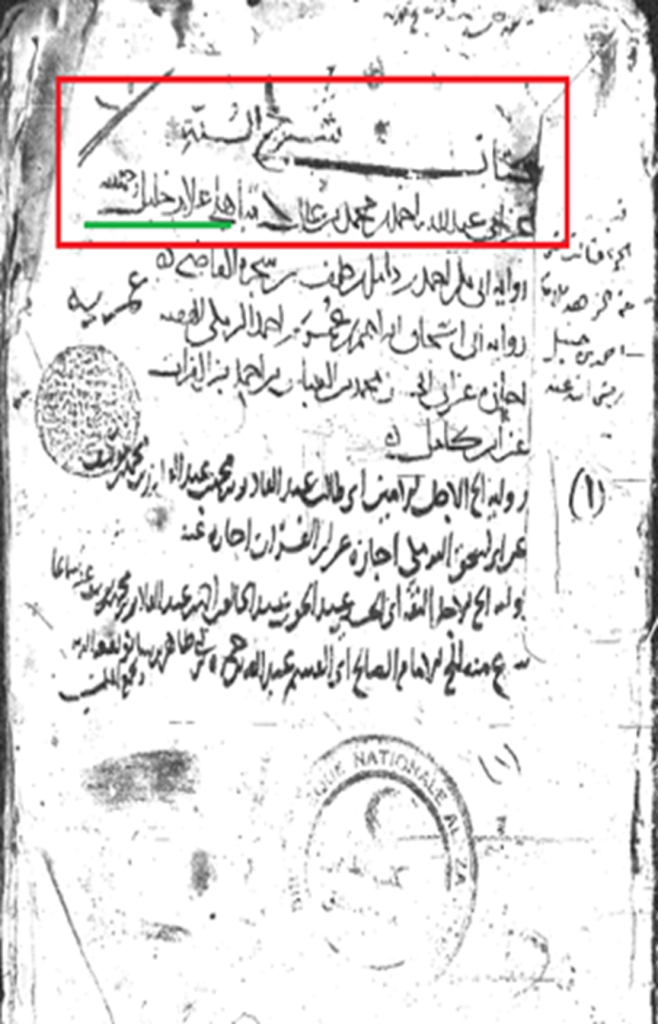
The first page has the sanad:

Maher Jarrar mentioned the above sanad in English as follows on p. 153:
The trustworthy master and prominent scholar (al-Shaykh al-Imam) Abū l- Ḥusayn ʿAbd al-Ḥaqq b. ʿAbd al-Khāliq transmitted to us by having the text read in his presence (qirāʾatan): Abū Ṭālib ʿAbd al-Qādir ibn Muḥammad ibn Yūsuf transmitted to us in an audited session (wa-naḥnu nasmaʿu) in the con- gregational mosque. It was said to him (qīla lahu): Shaykh Abū Isḥāq Ibrāhīm b. ʿUmar b. Aḥmad al-Barmakī transmitted to you, among what he had authorized you to transmit, an authorization that was publically known, he replied, “Yes.” He said: Abū l-Ḥasan Muḥammad b. al-ʿAbbās b. Aḥmad b. al-Furāt—may God have mercy on him—informed us in his book, and it was transmitted [to us] by way of an audited transmission (wa-min kitābihi quriʾa). He said: Abū Bakr Aḥmad b. Kāmil ibn Khalaf b. Shajara the judge transmitted to us by way of direct reading before him (qirāʾatan ʿalayhi); and he said to me: Transmit this book on my authority from beginning to end.
Abū ʿAbdallāh Aḥmad b. Muḥammad b. Ghālib al-Bāhilī[1]—may peace and blessings be upon him — said:
The following lines from the Sharhus Sunna of Ghulam Khailil was presented in the Khalid al-Radadi edition in Arabic (p. 117):
[1] This is Ghulam Khalil.

It was also published in the Maher Jarrar edition (p. 318):

Part of the above portion in brackets in the Radadi edition was not translated into English by Dawud Burbank.[1] Maher Jarrar[2] provided the translation and the words missing from the Burbank translation were the first three names in the isnad given in Arabic:
As for Aḥmad b. Kāmil,38 he said: “Al-Ḥusayn b. Muḥammad b. al-Ṭabarī informed me that Mardawayh al-Ṣāʾigh said, ‘I heard Fuḍayl saying: “If I were to invoke God only once, I would invoke Him for the ruler.”
The following is the last page of the manuscript (folio 19v):
[1] See p. 85 of the above English edition entitled: “Explanation of the Creed.”
[2] See p. 182.
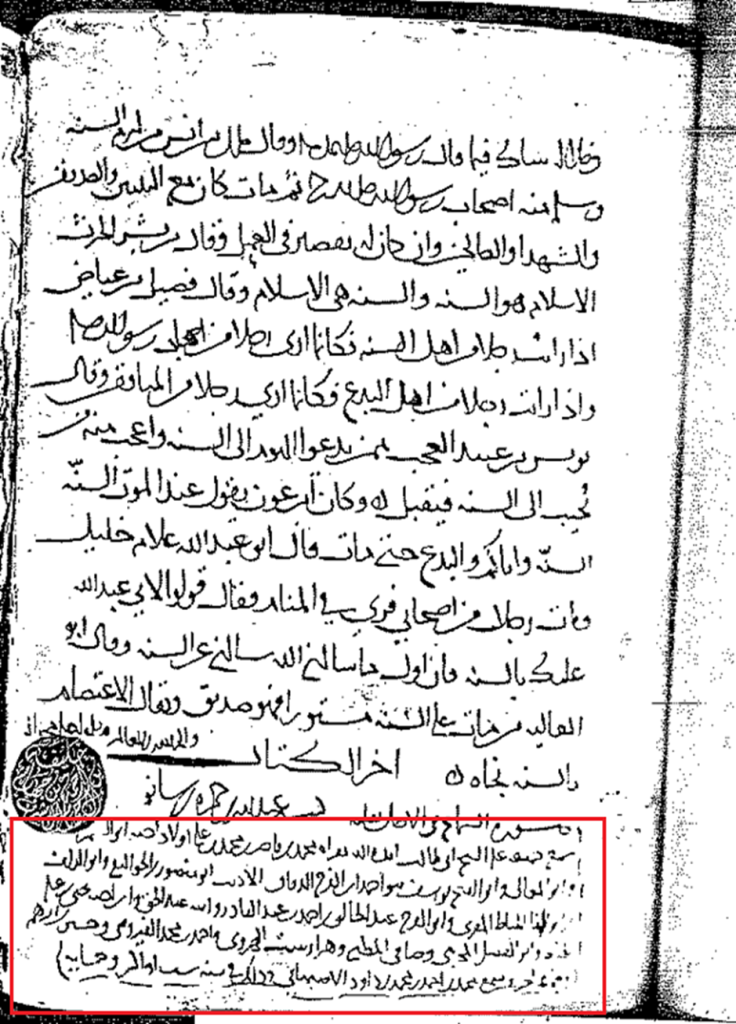
The part in the box in the above image was not presented in al-Radadi’s edition and it was provided by Maher Jarrar in his edition (pp. 336-337) as follows:
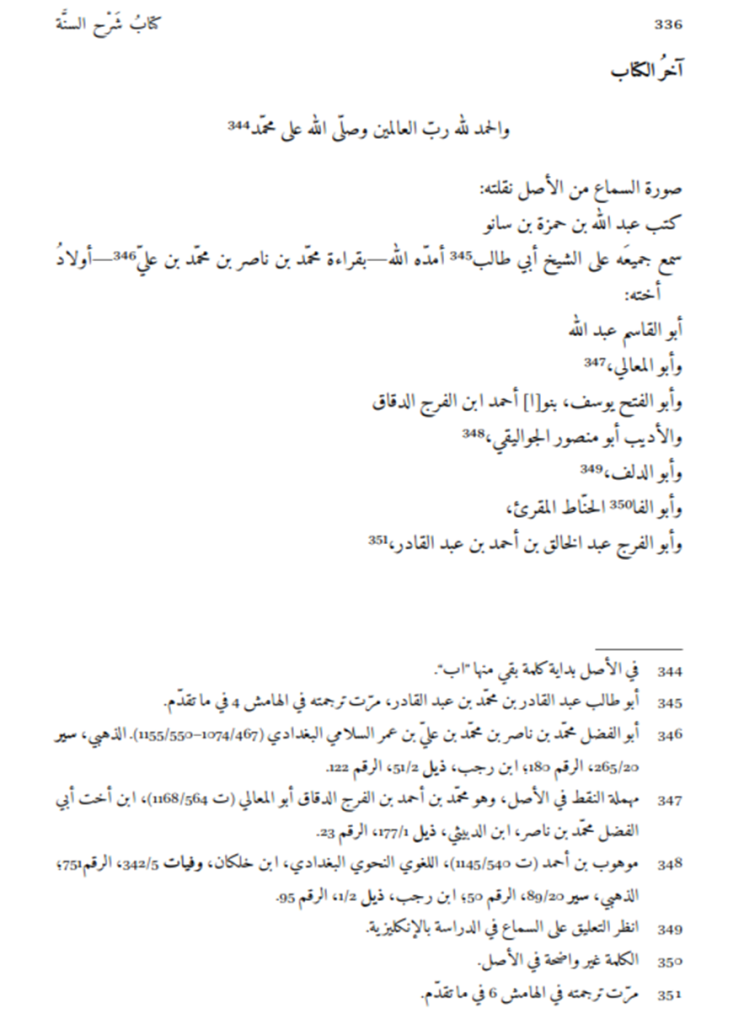
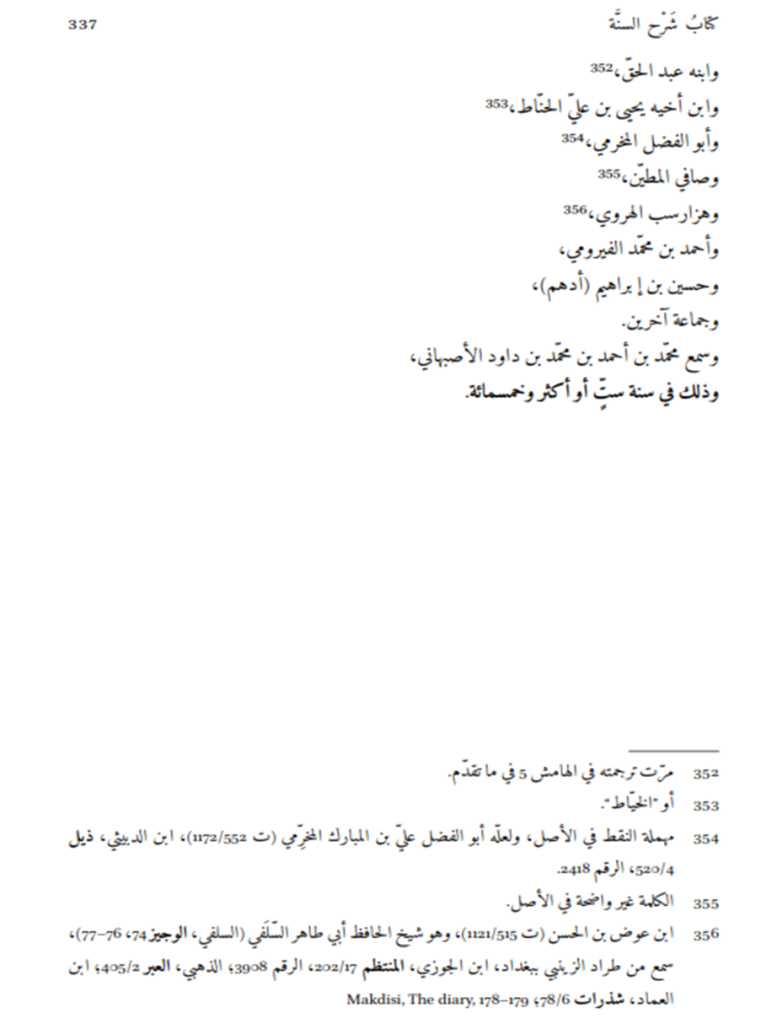
Maher Jarrar mentioned the above in English as follows (pp. 32-33):
On the very last page of the manuscript (fol. 19v), the name ʿAbdallāh b. Ḥamza appears again. This additional note is part of a kind of attendance sheet used in higher Muslim education to attest the names of those present in the given teaching session, or samāʿ assembly. Importantly, in this note of attendance ʿAbdallāh b. Ḥamza gives the date of the teaching session that the Damascus manuscript contains as “the year 506/1112 or sometime later.” Furthermore, the respective samāʿ certificate names another 14 participants in this teaching session. Although the certificate does not record the location of this lecture, the names of the attendees indicate that it took place in Baghdad. ʿAbdallāh b. Ḥamza reproduced the following note about this assembly:
The reproduction of the audition (ṣūrat al-samāʿ) which I copied from the original [is as follows]: ʿAbdallāh b. Ḥamza b. Sānū wrote: “The book in its entirety was taught [lit. heard] in a session of al-Shaykh Abū Ṭālib— may God grant him support—with his maternal nephews present, while Muḥammad b. Nāṣir b. Muḥammad b. ʿAlī was reading, [the session was attended by]:
Abū l-Qāsim ʿAbdallāh, Abū l-Maʿālī,
Abū l-Fatḥ Yūsuf, the sons of Aḥmad b. al-Faraj al-Daqqāq,
and by
Abū Manṣūr al-Jawālīqī, Abū l-Dulaf,
Abū l-Fa[…] al-Ḥannāṭ al-Muqriʾ,
Abū l-Faraj ʿAbd al-Khāliq b. Aḥmad b. ʿAbd al-Qādir, and his son
ʿAbd al-Ḥaqq b. ʿAbd al-Khāliq, Yaḥyā b. ʿAlī al-Ḥannāṭ,
Abū l-Faḍl al-Mukharrimī, Ṣāfī al-Muṭayyin,
Hazārasb al-Harawī,
Aḥmad b. Muḥammad al-Fayrūmī, Ḥusayn b. Ibrāhīm (or Adham),
Muḥammad b. Aḥmad b. Muḥammad b. Dāwūd al-Iṣbahānī. This [took place] in the year six or more32 and five hundred.”
End of quotes.
—————————————
Compiled by:
Abul Hasan Hussain Ahmed
23nd May 2025/25th Dhu’l Qa’da 1446 AH
(www.darultahqiq.com, Updates on Telegram: https://t.me/Darul_Tahqiq)
Download the above as a PDF file – HERE


